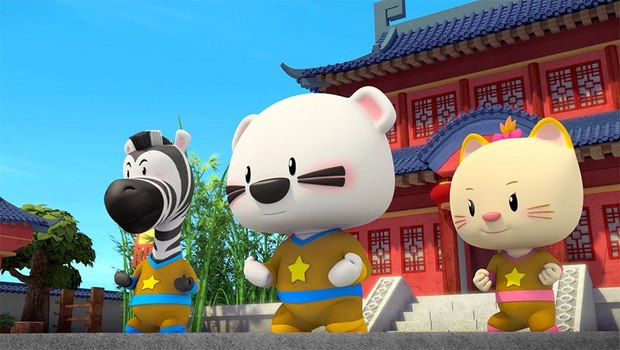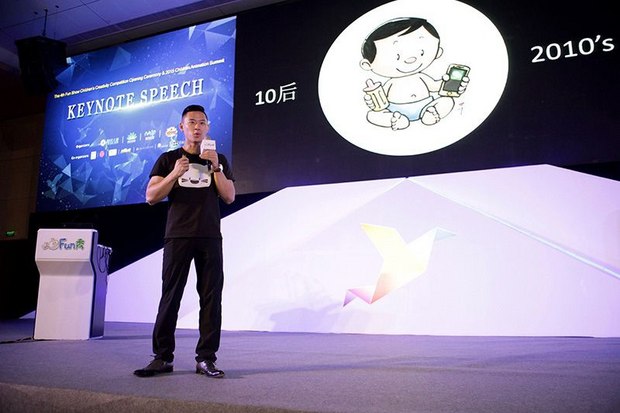Suzhou’s Up Studios founder is masterminding an IP empire, with his latest series debut racking up over 300 million views on Tencent Video.
The latest Chinese-produced animated hit, Super BOOMi, has surpassed 300 million views since launching July 20th on Tencent Video, making it the top-ranked new kids program on the platform. The 52-episode x 11" 3D CG show, about an imaginative little bear and his dog Bibop, who invent a virtual reality world where toys come to life, also launched on national television on Beijing TV's kids channel KAKU during China's peak Golden Week holiday this past September 30th. Across two weekends in November, the show topped the national television ratings chart, making it the number one cartoon on during prime time across all networks in China.
Super BOOMi is the first animated series from Suzhou-based original content boutique, Up Studios. The show’s popularity is no small achievement considering it is competing in a crowded marketplace against established international franchises and domestic output from wealthy government-backed conglomerates.
Up Studios’ founder and leader is Canadian writer, illustrator and entrepreneur Trevor Lai. I first met Lai in 2015, at which time he outlined his outlandishly ambitious plans to construct an entertainment empire built around original IP. Almost two years later, with the ink still drying on the 8-figure Renminbi (7-figure USD) Tencent deal, and the company’s five-year anniversary approaching, I joined him in Shanghai to discuss the latest milestones on a remarkable journey so far.
License to Build
Trevor Lai was born and raised in Vancouver by parents of Hangzhou, Hong Kong and Taiwanese descent. He spent the first decade of his career with a branding and design company, a role that led him to Shanghai in 2006 and exposed him to China’s exploding commercial and entertainment markets. New businesses were emerging at a furious rate, bringing unprecedented opportunities for creators of character IP that could be licensed to brands and products.
In 2010, at the height of the vinyl toy craze, Lai decided to test the market with a limited edition figurine of his new character BOOMi, positioned as a fashion accessory. Though there were already innumerable 2D icons adorning packaging, products and shop fronts across China, he saw a gap for characters with a cute Asian aesthetic, but fleshed out with a backstory.
According to Lai, “When I created BOOMi, it was purposeful. Nobody had done a well-designed character that is sophisticated-cute, rather than juvenile-cute, and done it systematically.” Strong sales confirmed there was a demand for his plan to launch “the next Hello Kitty, but created in China.” Emboldened, he founded UP Studios in 2012, with the ultimate goal of creating characters that would “inspire multiple generations of families in China and around the world.”
He made the decision early on to be a licensing rather than manufacturing company, fuelling the company’s early growth by creating bespoke characters for car brands, malls and schools. Those deal were supplemented by products like the BOOMi Camera app, which Lai showcased in a tour of Apple’s China and Hong Kong flagship stores. Things accelerated in January 2016, when he signed a major licensing deal with IHG Intercontinental Hotel Group to apply BOOMi’s image to a family package for over 80 of the group’s Holiday Inn hotels and resorts across China.
The relationship with Tencent began in earnest last year, when a customizable BOOMi storybook product became the first branded property to make it on to Tencent Kids’ DIY digital platform. The Internet colossus’ newly formed in-house film content arm, Tencent Pictures, would later invest in the production of the Super BOOMi series, while its ubiquitous WeChat smartphone app would provide a promotional platform unrivalled by any other in China.
Journey to the West
Up Studios may be based in China, but Lai stresses that neither location nor nationality defines his company. He looks for universal stories rather than those based on Chinese culture or heritage. “We definitely consider the Chinese market for all [our properties] but they don’t necessarily have to launch here first,” he explains. “I’m really proud of the fact that we make shows as a Chinese company, and the success we have in the local market is wonderful. But, I think the international validation of the concept has to be, ‘Now its on the BBC, now it’s on CBC in Canada, and oh, by the way, it was created in China.’”
Indeed, some of his main achievements to date are with international publishers. In 2015, Bloomsbury Children’s Books signed another of his characters, Piggy, on a six-figure picture book series contract, the largest ever US debut deal for a children’s author in China. That was followed by a deal with Macmillan Children’s Publishing Group for a book series based on his explorer, Tomo.
Lai’s unique cross-cultural skillset has been central to his progress so far. Living and doing business in China for almost twelve years, and speaking fluent Mandarin, has enabled him to create content that resonates locally and, crucially, do the deals that get it seen. Unlike other business-savvy local studios, he feels he benefits from an innate understanding of international storytelling gained growing up watching animation in Canada. He notes, “Even if you show [a Chinese-born writer] 50 episodes of a Western cartoon, I don’t think they’ll necessarily get it as quickly as if they’ve grown up with it.”
Standing Out
Cultural sensibilities aside, I ask what Lai feels separates him from other young animation studios in China chasing success at home and abroad. “It’s discipline and vision,” he replies. “Sticking to the vision I’ve had since I started the company until now has not always been easy. But, persevering has begun to yield real rewards from a business perspective.”
Commitment to that vision has seen Up Studios resolutely refuse outsource production work and turn down character creation projects that Lai didn't believe in. Driving everything is his pursuit of exceptional storytelling, a core value inspired by the likes of Pixar and Disney, studios that made major changes to films like Toy Story 2 and Zootopia well into the production run.
Although Lai expresses gratitude for the few production companies he works with who share his high-quality values and commitment to training, he feels many Chinese studios are still falling short in this regard. “Very few companies realise the intense amount of work it takes to train their teams properly, as great companies do,” he explains. “If companies in China want to have Disney’s success, they need to do the things that Disney does. It’s very easy to emulate the skin of a champion, but you can’t build the muscles unless you actually go to the gym.”
He acknowledges that many local creators and studio CEOs haven’t enjoyed the benefits of the creative feedback he relishes from world-class publishers, but still believes they would benefit from seeking advice from more experienced professionals and wishes more production companies would invest in training. He feels their failure to do so is a symptom of a creeping indifference spreading among many domestic animation companies. He has felt the problem most keenly when trying to source production partners, noting, “I bet if you analyse production companies in China, the vast majority, even if they pay lip service to [reaching international quality], don’t execute based on that. They make the same mistakes over and over and over again and it drives me nuts.”
Worse still, he sees that attitude filtering down to young and impressionable artists for whom he says the grass is always greener and small short-term gains from a job change trump commitment to a greater goal.
The Road Ahead
It would be easy to get despondent, but Lai wouldn’t have survived this long in China without optimism. He likes to give motivational talks to galvanise his peers and to seek out like-minded talent, figuring that out of the thousands of professionals out there, “Three to five percent of them probably hold similar ideals as Up Studios.” Lai adds, “Right now they’re buried in companies and slowly getting the life squeezed out of them. It’s sad. If I can just find them, we would give them a positive environment and an opportunity where they could learn how to improve their skills.”
With his own core staff of 30, apart from the odd town-hall type meetings, he tries to talk as little as possible. Once he has laid out the company roadmap, he requires each individual to take ownership of the project, explaining to them, “I can tell you about my vision day in and day out. But the only thing that matters is our execution. Some get it and some don’t.”
For those along for the ride, there is much to look forward to. Production of series two of Super BOOMi will immediately follow the first and he anticipates animated series for Piggy and Tomo won't be far behind. Lai is in the early stages of penning a BOOMi feature film treatment and within two years hopes to have his characters appearing in many of the theme parks sprouting up around China.
But he’s not getting carried away. “It’s not like we won an Oscar,” he notes. “We’ve survived so let’s keep going.”
He turns and gestures to the people in the café, “Until the day that I can ask these people, ‘Who is BOOMi?’ and they all say ‘He’s this really cute bear that has a great show on Tencent Video and my cousin went with her kids to his theme park the other day.’ THAT is doing something. I’m just excited that, with the show on now, tens of millions of people are getting access to it and with that we can really start to become part of the cultural fabric.”
Chris is a writer & producer based in Shanghai. He’s the founder of the China Animation & Game Network, encouraging communication in the industry via live creative networking events.















